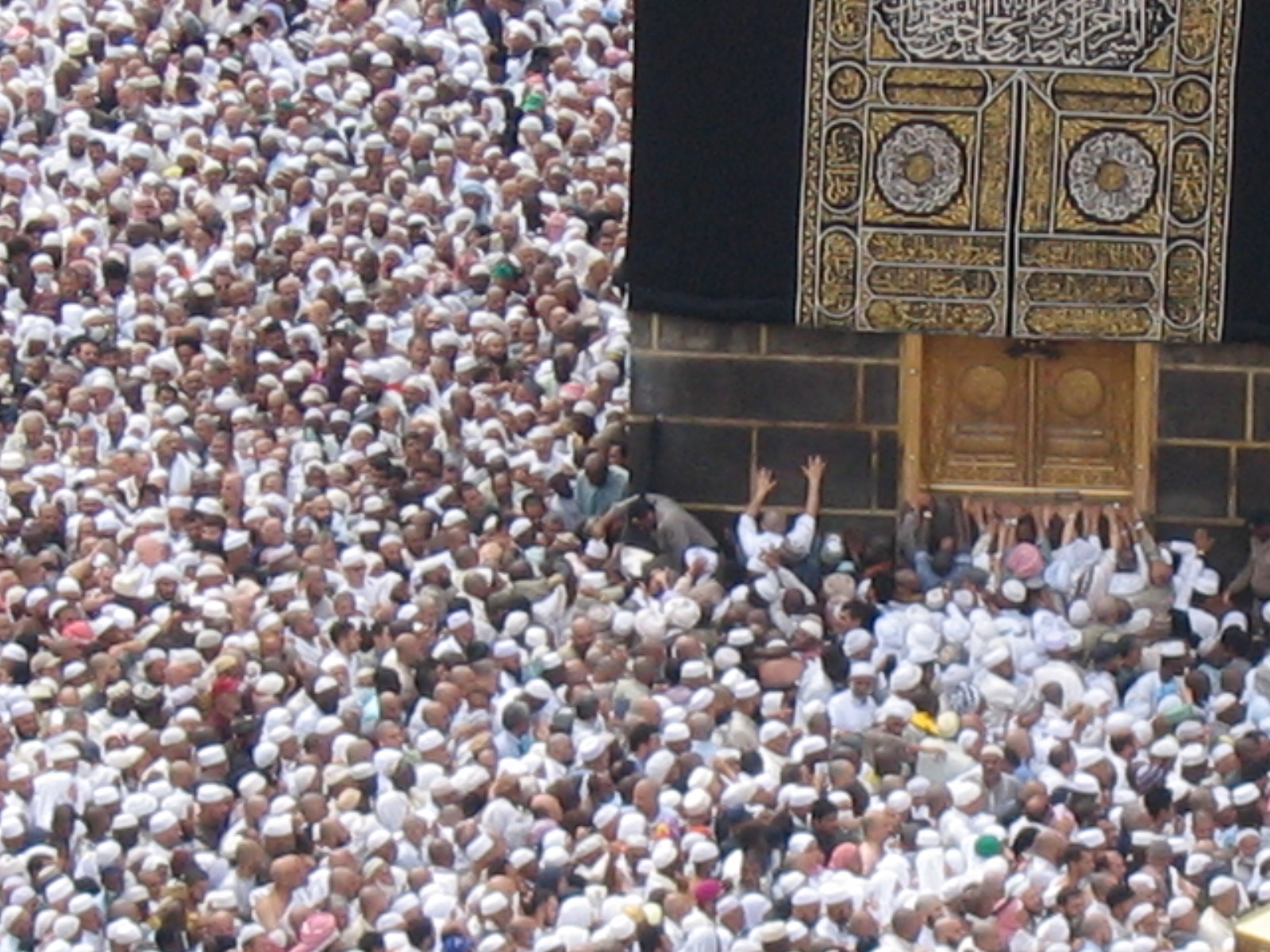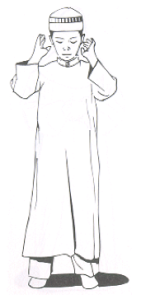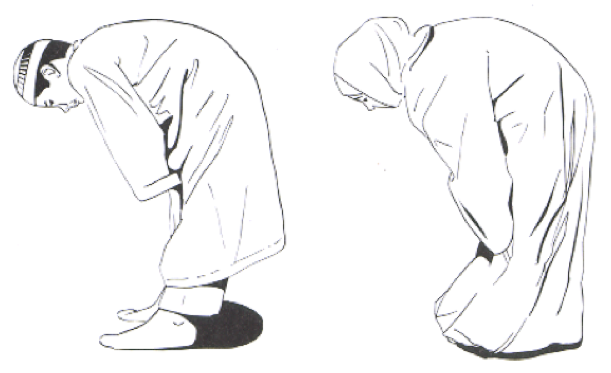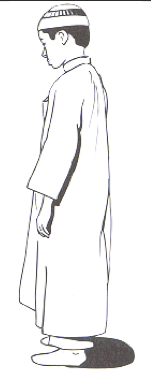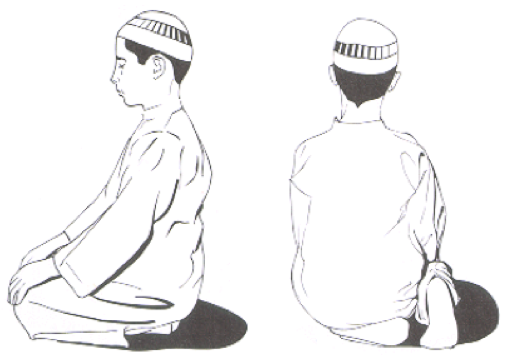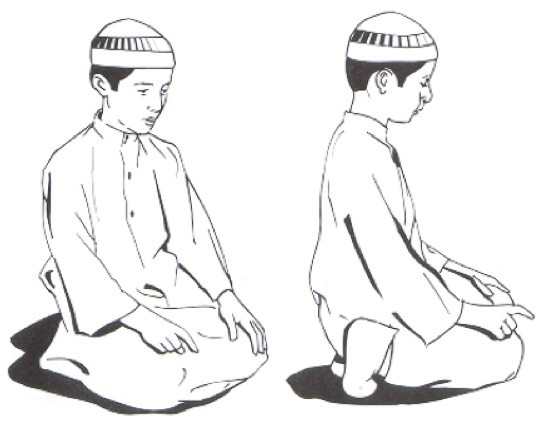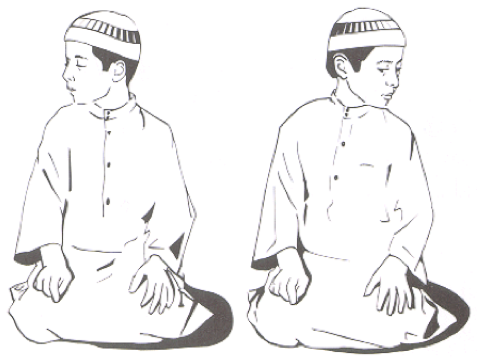Category Archives: English
Big Nights and Days of Islam: Dhul Hijjah
In the Name of Allah, The Beneficent, The Merciful
Prayers and Peace upon His Noble Messenger
Â
Dhul Hijjah is the 12th and last month of the Islamic lunar calendar. It is one of the four sacred months, the other three being Muharram, Rajab Dhul Qa’dah. Only Rajab is on its own, the other three come together. Dhul Hijjah’s significance is enormous as related in the Holy Quran, and the sayings of the Holy Prophet sal Allahu alayhi wa sallam and His Noble Companions (may Allah be pleased with them all).
Allah, Almighty and Glorious is He, says in the Holy Quran:
“And by oath of ten nights.â€
                                                                                   [Al-Fajr 89:2]
Hazrat Ibn Abbas (may Allah be pleased with him and his father), the great Companion of the Holy Prophet sal Allahu alayhi wa sallam and illustrious exegete of the Holy Quran explained that the expression “and ten nights [wa layaalin ‘ashr]†refers to the ten special nights at the beginning of the month of Dhul Hijjah.
Hazrat Abu Saeed al-Khudri (may Allah be pleased with him), another great Companion of the Holy Prophet sal Allahu alayhi wa sallam reported that the Holy Prophet sal Allahu alayhi wa sallam said:
“The chieftain [sayyid] of the months is the month of Ramadan, and the mightiest of them in sanctity [hurma] is Dhul-Hijjah.â€
According to Hazrat Abu Huraira (may Allah be pleased with him), the Holy Prophet sal Allahu alayhi wa sallam said that:
“Of all the days, there are none in which Allah, Exalted is He, more dearly loves to have worshipful service performed for His sake, other than the Ten Days of Dhul Hijjah. To devote just one of the them to fasting is equivalent to fasting for one whole year, and keeping vigil on one of these nights is like keeping vigil for one whole year.â€
Narrated Hazrat Ibn Abbas radi Allahu anhuma: The Prophet alayhi salatu wa salaam said,
“No good deeds done on other days are superior to those done on these (first ten days of Dhul Hijjah).†Then some Companions radi Allahu anhum of the Prophet alayhi salatu wa salaam said, “Not even Jihad?†He alayhi salatu wa salaam replied, “Not even Jihad, except that of a man who does it by putting himself and his property in danger (for Allah’s sake) and does not return with any of those things.†[Bukhari Shareef, Volume 2, Book 15, Number 86]
Sayyidina Abu Hurairah radi Allahu anhu reported that the Prophet sal Allahu alayhi wa sallam said,
“None of the days are dearer to Allah during which He is worshipped than the ten days of Dhul Hijjah. Fasting on each of these days is like fasting for a year and standing (in worship) on each of its nights is like standing on Laylatul Qadr.†[Jami’ At-Tirmidhi Hadeeth #758, Ibn Majah Hadeeth #1728]
***
Hazrat Ali (may Allah ennoble his face) reported that the Holy Prophet sal Allahu alayhi wa sallam once said:
“When the Ten [Days and Nights] of Dhul-Hijja come around, you must devote yourselves strenuously to worshipful obedience, for they are the days upon which Allah, Exalted is He, has bestowed His special favor, and He has made the sanctity of their nighttime equivalent to the sanctity of their daytime. So if a worshipper prays during any night of the Ten Nights, performing four cycles of ritual prayer [raka’at] in the last third [of the night], and including the following recitations from the Holy Quran in each cycle:
Â
- Surah Al-Fatiha [1:1-7] once
- Surah Al-Falaq [113:1-5] Surah An-Naas[114:1-6] once each
- Surah Al-Ikhlaas [112:1-4] 3 times and
- Ayat Al-Kursi [2:255] 3 times
Â
and if he raises his hands, as soon as he has completed this ritual prayer and says:
Â
Subhaana Dhil-‘Izzati wal-Jabaroot. Subhaana Dhil-Qudrati wal-Malakoot. Subhaanal-Hayyil-ladhee laa yamoot. Laa ilaaha illa Huwa yuhyee wa yumeetu wa Huwa Hayyun laa yamoot. Subhaanal-laahi Rabbil-‘ibaadi wal-bilaad. Al-hamdu lil-laahi katheeran wa tayyiban wa mubaarakan ‘alaa kulli haal. Allahu Akbaru kabeera Rabbanaa jalla Jalaaluhu wa Qudratuhu bi-kulli makaan.
Â
and if he then pleads for whatever he wishes, he will be entitled to the same reward as someone who perform the Pilgrimage to the Sacred House of Allah, visits the tomb of the Prophet y and strives in the cause of Allah. Whatever he asks of Allah, He will surely grant him his request.
Â
If he performs that same ritual prayer during every night of the Ten Nights, Allah, Exalted is He, will grant him lawful access to the Highest Paradise [al-Firdaws al-A’laa] and He will erase every bad deed from his record. ‘Now set about your work from a new beginning,’ he will be told.
Â
If it happens to be the Day of ‘Arafa, and he devotes the daytime thereof to fasting and night thereof to ritual prayer, and he pronounces this invocation and he offers many a humble entreaty in the presence of Allah, Exalted is He, Allah will say: ‘O My angels, bear witness that I have granted him forgiveness, and that I have equated him with the Pilgrim of the House of Allah [al- Haajj ilaa Baitillah].’ The angels will be delighted to learn what Allah, Exalted is He, has bestowed upon that believing servant, as a reward for his ritual prayer and his invocation.â€
***
Hazrat Ibn Abbas (may Allah be pleased with him and his father) said:
We were in the company of Allah’s Messenger sal Allahu alayhi wa sallam, when a group of people arrived from Yemen. They said: “May our mothers and fathers be our ransom! Will you tell us about the special merits of the Pilgrimage [Hajj]?†He sal Allahu alayhi wa sallam said:
“Yes! If any mans sets out from his home, as a Pilgrim or a Visitant, whenever he lifts a foot, or sets a foot down on the ground, sins are scattered from his feet, just as leaves are scattered from the trees. Then, when he reaches the city of Medina, shakes my hand, and salutes me with the greeting of peace [salaam], the angels will likewise salute him with the greeting of peace. Then when he reaches Dhul Haleefa (the miqat or meeting point for Pilgrims approaching Mecca from the direction of Medina), and performs the major ritual ablution, Allah will purify him of his sins. When he puts on two new pieces of clothing, Allah will renew his good deeds for him….†(Please refer to the source text for the entire Hadeeth, which is quite extensive.)
***
Â
Hazrat Ibn Umar (may Allah be pleased with him and his father) said that he heard Allah’s Messenger sal Allahu alayhi wa sallam say:
“Allah, Exalted is He, inspects His servants on the Day of ‘Arafa, and if there is an atom’s weight of faith [imaan] in the heart of any one of them, He grants them forgiveness without fail.â€
Fasting on the 9th of Dhul Hijjah
Hazrat Abu Qatada al-Ansari (Allah be pleased with him) reported that the Messenger of Allah (may blessings and peace be upon him) … was asked about fasting on the day of ‘Arafa (9th of Dhu’I-Hijja), whereupon he said:
“It expiates the sins of the preceding year and the coming year….†[Sahih Muslim, Book 006, Hadeeth #2603][1]
Â
Ritual Prayer to Be Recited on the 9th of Dhul Hijjah
Hazrat Abu Huraira (may Allah be pleased with him) said that the Holy Prophet sal Allahu alayhi wa sallam said:
“If someone performs four voluntary cycles of ritual prayer, on the Day of ‘Arafa, between the Dhuhr and ‘Asr reciting in each cycle Surah Al-Faatiha one time, and Surah Al-Ikhlaas 50 times, one million good deeds will be recorded in his credit column. For every letter in the Quran, he will be promoted by one level in the Garden of Paradise, the distance between each level and the next being a journey of fifty years…†(Please refer to the source text for the remaining benefits of performing this prayer.)
Also, in another traditional report, Hazrat Abdullah ibn Masud (may Allah be pleased with him) said that the Holy Prophet sal Allahu alayhi wa sallam said:
“If someone performs two voluntary cycles of ritual prayer on the Day of ‘Arafa, reciting in each cycle:
Â
- Surah Al-Faatiha 3 times, each beginning with the Basmala (Bismillaahir-rahmaanir-raheem) and ending with Aameen,
- Surah Al-Kaafiroon [109:1-6] 3 times, and
- Surah Al-Ikhlaas once, beginning each time with the Basmala,
Â
Allah (Exalted is He) will surely say [to the angels]: ‘Bear witness that I have granted him forgiveness for his sins.’â€
***
Â
In the ritual prayer of the Night of Sacrifice (i.e. the night preceding the day of Eid), the worshipper must perform two cycles of prayer, reciting in each cycle:
- Surah Al-Faatiha 15 times, and
- Surah Al-Ikhlaas 15 times, and
- Surah Al-Falaq 15 times, and
- Surah An-Naas 15 times
After concluding the prayer he should:
- recite Ayat-ul-Kursi 3 times
- seek forgiveness of Allah 15 times, and then:
- appeal for whatever he wishes from the good of this world and the Hereafter.
Â
When the believer sets out to attend the Festival prayer, following a particular route, he is recommended to return home by a different route. This advice is based on the report of Hazrat Ibn Abbas (may Allah be pleased with him and his father) who said that the Holy Prophet y took one road [to the congregational prayer] on the Day of the Festival, and used a different road on His way back home.
Udhiyya (Qurbani)
Â
The animal sacrifice (udhiyya /qurbani) is a customary practice (Sunnah) in the Hanbali, Maliki, and Shafi madhhabs, the omission of which is not recommended for anyone who is capable of performing it. In the Hanafi it is strictly necessary (wajib) (technically same as Fard in terms of implementation).
***
We pray that Allah, Most Glorified and Exalted is He, by the waseela (connection) of His Beloved Prophet (Prayers and Peace be upon Him) accepts the Hajj of all those who had the good fortune to go this year and may He grant the opportunity to those who desire the journey in future years. May He forgive our faults and accept our worship and make us true servants of His Noble Friends (Awliya Kiram). Aameen.
[1] Part of a larger Hadeeth text
Salat According to Shafii Fiqh
بسم الله الرØمن الرØيم
Book of Salat (Shafi`i)
The Five Obligatory Prayers
The Messenger of Allah (s) said: “There are five prayers that Allah obligated the slaves to perform. Whoever performs them properly without belittling their obligation, Allah promised to admit him into Paradise. Whoever leaves them out does not have a promise from Allah to enter Paradise without being punished first. If He willed, He tortures him, and if He willed, He forgives him†– Narrated by Ahmad in his Musnad. As such, it is obligatory to perform each of these five prayers in its due time. It is better to perform each prayer early in its time.
Subh or Fajr (Dawn) Prayer – 2 raka`ats (Cycles)
The true dawn begins when we see light spread at the horizon in the East. When the true dawn appears the Fajr prayer time has begun and this prayer time remains until the first glimpse of the disk of the sun appears on the Eastern horizon.
Zhuhr (Noon) Prayer – 4 raka`ats (Cycles)
Its time begins when the sun has declined westward from the middle of the sky (zenith). The time remains until the length of the shadow of an object becomes equal to that of the object per se, in addition to the length of the shadow of that object when the sun was at its zenith. For example, if the length of your shadow when the sun is at its zenith is 5 feet and you are 6 feet high, then once your shadow becomes 11feet long the Zhuhr prayer time ends.
`Asr (Mid-afternoon) Prayer – 4 raka`ats (Cycles)
As soon as the Dhuhr prayer time ends the Asr prayer time starts. Its time remains until sunset.
Maghrib (Sunset) Prayer – 3 raka`ats (Cycles)
After the entire disk of the sun has set, then the Maghrib prayer time begins. This prayer time lasts until the redness has disappeared in the western horizon.
`Isha’ (Nightfall) Prayer – 4 raka`ats (Cycles)
As soon as the Maghrib prayer time is finished the Isha’ prayer time begins. You can be certain that this prayer time is in when you can see many small stars in the sky on a clear night. This prayer time lasts until the true dawn appears.
Conduct of Salat
Sutra
Before a person starts to pray he should place something a short distance in front of him of the place where he prostrates (does sajda). Such an object is called sutra and is used when the person is praying alone. A person passing in front of the person in prayer, should pass on the outside of the sutra. If someone is praying in congregation, then the imam acts as the sutra. The imam, however, must have his own individual sutra in front of him.
Qiblah
Wherever a person is in the world, he should face towards the Ka’bah when he is going to pray. The Ka`bah is in the sacred masjid of Makkah in Saudi Arabi. Facing towards Qiblah (Ka`bah) is a very important condition of performance of prayer.
Niyyah, Intention
After facing the Qiblah the person should make niyyah (intention). The intention is made within his mind, so the person should think about the particular obligatory, optional or nafl prayer he intends to perform.
Takbir Tahrimah – Takbirat al-Ihram
After making Niyyah the person should start his prayer saying “Allahu Akbar†(Allah is the greatest) raising both of his hands to the shoulders, with fingers stretching to the ear lobes. (For Hanafis, the thumbs should rub against the ear lobes).
He should then fold his hands in between his chest and navel (Shafi`i) or on the navel (Hanafi) with his right hand over the left hand. This time “Allahu Akbar†is called Takbir Tahrimah because after saying Takbir Tahrimah every common and worldly action, talk or movement is forbidden. Throughout the prayer the eyes of the worshiper should point to the spot where the forehead rests in sajda.
Recitation Before Surat al-Fatiha
There are several du`as (invocations) the Prophet (s) recited before Fatihah:  اللَّهÙÙ…ÙŽÙ‘ باعÙدْ بَيْني ÙˆÙŽ بَيْنَ خَطايايَ كَما باعَدْتَ بَيْنَ المَشْرÙÙ‚Ù ÙˆÙŽ المَغْرَبÙØŒ اللَّهÙÙ…ÙŽÙ‘ Ù†ÙŽÙ‚Ùّني Ù…ÙÙ† خَطايايَ كَما ÙŠÙنَقّى الثَّوْب٠الأَبْيَض٠مÙÙ†ÙŽ الدَّنَسÙØŒ اللَّهÙÙ…ÙŽÙ‘ اغْسÙلْني Ù…ÙÙ† خَطايايَ بÙالماء٠وَ الثَّلْج٠وَ البَرَدÙ.
Allahuma bai`d baynee wa bayna khataya kama ba-`adta bayn al-mashriqi wa’l-maghrib. Allahuma naqiniyy min al-khataya kama yunaqqi ath-thawba min ad-danas. Allahuma ‘ghsilniyy min khataya bi ‘l-mai wa ‘th-thulji wa ‘l-barad
O Allah set me apart from my sins as East and West are apart from each other. O Allah, cleanse me from my sins as a white garment is deansed from dirt after thorough washing. O Allah, wash me off from my sins with water, snow and hail.
If a person does not know the above du`a then he should recite the following one:
سÙبْØانَكَ اللَّهÙÙ…ÙŽÙ‘ ÙˆÙŽ بÙØَمْدÙÙƒÙŽ ÙˆÙŽ تَبارَكَ اسْمÙÙƒÙŽ ÙˆÙŽ تَعالى جَدÙّكَ ÙˆÙŽ لا Ø¥Ùلهَ غَيْرÙÙƒ
Subhanak Allahuma wa bi-hamdika wa tabaraka ismuka ta`ala jaduka wa la ilaha ghayruka.
Glory be to you, O Allah, and all praises are due unto you, and blessed is your name and high is your majesty and none is worthy of worship but you.â€
Ta`awwudh Tasmiyya (Basmala)
Then the person who is praying should recite the following silently:
أَعوذ٠بÙالله٠مÙÙ†ÙŽ الشَّيْطان٠الرَّجيمÙ. بÙسْم٠الله٠الرَّØْمن٠الرَّØÙيم
a`udhu billah mina ‘sh-shaytani ‘r-rajeem Bismillahi ‘r-Rahmani ‘r-Raheem
I seek Allah’s protection from Satan the accursed. In the name of Allah, The Beneficent and The Merciful†(The Basmalah should be said in every raka`at before reciting Surah Al-Fatihah.)
Surat al-Fatiha
Then the person should recite Surat al-Fatihah:
الْØَمْد٠لله٠رَبÙÙ‘ الْعالَمينَ۞ الرَّØْمن٠الرَّØيمÙÛž مالÙك٠يَوْمَ الدّينÙÛž Ø¥Ùيّاكَ نَعْبÙد٠وَ Ø¥Ùيّاكَ نَسْتَعينَ۞ اÙهْدÙنا الصÙّراطَ الْمÙسْتَقيمَ۞ صÙراطَ الَّذيْنَ أَنْعَمْتَ عَلَيْهÙمْ غَيْر٠الْمَغْضوب٠عَلَيْهÙمْ ÙˆÙŽ لا الضَّآلÙّينَ۞ آمين.
Alhamdu lillahi Rabbi ‘l-`alamin ar-Rahmani ‘r-Raheem Maliki yawmi-d-Din. Iyya-ka na`budu wa iyyaka nasta`een, ihdina ‘s-sirat al-mustaqim, sirat alladheena an`amta `alaihim ghair il-Maghdubi `alaihim wa la-d-daalleen
Praise is only for Allah, Lord of the Universe. The most kind, the most merciful. The master of the Day of Judgment. You alone we worship and to you alone we pray for help. Show us the straight way, the way of those whom you have blessed. Who have not deserved your anger, Nor gone astray.â€
Reciting al-Fatihah is so important that Prophet Muhammad (s) said that no prayer was acceptable without the recitation of al-Fatihah.
Ameen
It is sunnah to say Ameen when a person finishes recitation of Surah Al-Fatihah. If he is praying alone he should say “Ameen†in silence and if he is praying with congregation behind an Imam then he should say Ameen fairly loudly when the Imam finishes saying the last verse of Surah Al-Fatihah. When saying Ameen the voice of the whole congregation should resound at the same time.
Recitation After Surat al-Fatiha
It is sunnah for a person who is praying that he should read a surah from Quran after al-Fatihah in the first two raka`ats of the fard prayer. Here are a few short surahs which you can recite.
Surat al-Ikhlas
بÙسْم٠الله٠الرَّØْمن٠الرَّØÙيمÙ
Ù‚Ùلْ Ù‡ÙÙˆÙŽ الله٠أَØَدٌ۞ الله٠الصَّمَدÙÛž Ù„Ùمْ ÙŠÙŽÙ„Ùدْ ÙˆÙŽ لَمْ يولَدْ۞ ÙˆÙŽ لَمْ ÙŠÙŽÙƒÙنْ Ù„ÙŽÙ‡Ù ÙƒÙÙÙواً Ø£ÙŽØَدÙÛž
Qul huwa allahu ahad allahu ‘s-samad lam yalid wa lam yoolad wa lam yakun lahu kufuwan ahad
Say: He is Allah, the only one. Allah helps and does not need help. He does not produce a child, and He Was not born of anyone. There is no one like unto Him.
Surat al-Falaq
بÙسْم٠الله٠الرَّØْمن٠الرَّØÙيمÙ
Ù‚Ùلْ أَعوذ٠بÙرَبÙÙ‘ الْÙÙŽÙ„ÙŽÙ‚ÙÛž Ù…Ùنْ شَرÙÙ‘ ما خَلَقَ۞ ÙˆÙŽ Ù…Ùنْ شَرÙÙ‘ غاسÙق٠إÙذا وَقَبَ۞ ÙˆÙŽ Ù…Ùنْ شَرÙÙ‘ النَّـÙَّثَّـت٠ÙÙŠ الْعÙقَدÙÛž ÙˆÙŽÙ…Ùنْ شَرÙÙ‘ ØاسÙد٠إÙذَا Øَسَدَ۞
Qul a`udhu bi rabbi’l-falaq min sharri ma khalaq wa min sharri ghasiqin idha waqab wa min sharri’n-nafaathati fi’l-`uqad wa min sharri hasidin idha hasad.
Say: “I seek refuge in the Lord of the dawn, from the evil of all that He has treated, and from the evil of the darkness of night when it falls, and from the evil of those (charmers) who blow into knots. And from the evil of the envier when he envies.â€
Surat an-Nas
بÙسْم٠الله٠الرَّØْمن٠الرَّØÙيمÙ
Ù‚Ùلْ أَعÙوذ٠بÙرَبÙÙ‘ النَّاسÙÛž Ù…ÙŽÙ„Ùك٠النَّاسÙÛž Ø¥Ùله٠النَّاسÙÛž Ù…Ùنْ شَرÙÙ‘ الْوَسÙواس٠الْخَنَّاسÙÛž الَّذÙÙŠ ÙŠÙوَسْوÙس٠ÙÙÙŠ صÙدÙور٠النَّاسÙÛž Ù…ÙÙ†ÙŽ الْجÙنَّة٠وَ النَّاسÙÛž
Qul a`udhu bi rabbi ‘n-nas maliki ‘n-nas ilahi ‘n-nas, min sharri ‘l-was-wasi ‘l-khannas alladhee yuwaswisu fee sudoori ‘n-nas min al-jinnati wa ‘n-nas.
Say: “I seek refuge in the sustainer of mankind. the Owner of Mankind, Lord of Mankind. From the evil of the sneaking whisperer. Who whispers in the hearts of mankind. (Whether he be) from among jinns or mankind.â€
Ruku` -Â Bowing
Then the person praying should say “Allahu Akbar†raising both his hands to shoulder level with the palms facing outwards and fingers stretching to earlobes. He should then bend in ruku` so that his trunk (i.e. from head to hips) is perpendicular to the rest of the body. His hands should rest on his knees with the fingers spread apart, taking care that his arms do not touch his body. The person should be calm and composed in the ruku` posture and not hurry it.
سÙبْØانَ رَبÙّيَ الْعَظيم
Then he should read :â€Subhana Rabbiyy al-`azeem†at least three times. This means: “Glory be to my Lord Who is the Greatest.â€
Perfection of Ruku` and Sajda
Abi Masud al Badri (r) reported that the Messenger of Allah (s) said:
“Allah does not consider the prayer of a man who does not straighten his back when bowing for ruku` and performing Sajdah.†(Ibn Khuzaimah, Ibn Hibban, Tabrani)
Abi Qatadah (r) reported that the Messenger of Allah (s) said: ‘‘The worst thief is one who steals in his prayer.â€
Then the companions asked, “How can someone steal from his prayer?†Prophet (s) answered, “He does complete his ruku` and sajda with perfection.†(Ahmad, Tabrani, Ibn Khuzaimah, Hakim).
These hadiths prove that ruku` and sajda should be done calmly, slowly and perfectly. Otherwise the salat of the person will be deficient.
Qawmah/I`tidal – Standing after Ruku`
After the perfect ruku` the person praying should raise his head from ruku` saying:
سَمÙعَ الله٠لÙمَنْ ØÙŽÙ…Ùدَه
Sami` allahu liman hamidah “Verily Allah listens to the one who praises Him.â€
One should raise the hands up to the level of his shoulders with palms facing outwards and fingers stretched to the earlobes and then he should lower his hands to his sides. In the standing position he should be erect so that the joints of his body go back in place.
Du`as in Qawma
رَبَّنا Ù„ÙŽÙƒÙŽ الْØمْد٠Øَمْداً ÙƒÙŽØ«Ùيراً Ø·ÙŽÙŠÙّبَاً Ù…Ùبَارَكاً ÙÙيهÙ
Rabbana laka ‘l-hamd, hamdan kathiran tayyiban mubarakan feehi. Oh our Lord, all praises be to You, Very many, pure and blessed praises be to You.â€
First Sajda – Prostration
After the perfect qawmah the person praying should move to perform sajda saying:- “Allahu Akbar,†putting palms downwards on the ground below the ears. The knees should be brought downwards on the ground. His fingers and toes should be pointing towards Qiblah without spreading the fingers of the hands. In this position he should say:
سÙبْØَانَ رَبÙّيَ الْأَعْلى
Subhan Rabbee al-`Ala – “Oh Allah, glory be to you, the most high.†Importantly, during prostration seven parts of the body should touch the ground:
- The forehead along with the tip of the nose
- Both hands
- Both knees
- The bottom surface of the toes of both feet
Jalsa – Sitting Between Two Sajdas
After performing one sajda perfectly and calmly, the person praying should raise his head from sajda saying, “Allahu akbar“, bending the left foot and sitting on it while ‘keeping the right foot propped up with its toes pointing towards the Qiblah, the palms of his hands should rest on his thighs and knees. the back should be straight so that the joints go back in place. It is Sunnah to say the following du`a while sitting in between the two sajdas:
اللَّهÙÙ…ÙŽÙ‘ اغْÙÙرْلي ÙˆÙŽ ارْØَمْنÙÙŠ ÙˆÙŽ اهْدÙÙ†ÙÙŠ ÙˆÙŽ عَاÙÙÙ†ÙÙŠ ÙˆÙŽ ارْزÙقْنÙÙŠ ÙˆÙŽ اجْبÙرْنÙÙŠ ÙˆÙŽ ارْÙَعْنÙÙŠ
Allahuma ighfir lee w ‘arhamniyy w ‘ahdiniyy w ‘arzuqniyy w ‘ajburniyy w’arfa`niyy
Oh Allah, forgive me, and have mercy on me, and keep me on the right path, and keep me healthy, and provide me with halal sources of living, and complete my shortcomings, and make my rank high.â€
Second Sajda
Then the person should perform the second sajda saying, “Allahu Akbar†and repeat what he did in the first sajda.
Jalsa Istaraahat – Sitting for Rest
Then he should raise his head up saying. “Allahu Akbar†and sit for a short while as he did in jalsa. He does this before standing up for the second raka`at.
Second Raka`at
After standing up for the second raka`at he should fold his hands over his chest as he did in the first raka`at and start his recitation by reading “Basmalah and Surah-Fatihah followed by any passage or a chapter of the Holy Quran.†Then he should complete his second raka`at in the manner of the first one.
While choosing a passage or a chapter for the recitation in the second or a subsequent raka`at the worshipper should observe the order in which they occur in the Holy Quran. Also, each Surah or verse should be shorter than the one recited before it. Hence, longer surahs are recited before shorter surahs.
Tashahhud
After completing the last sajda of the second raka`at, the person should raise his head saying: “Allah Akbarâ€. He should sit as he sat between the two sajda, putting his left hand on his left knee and right hand on his right knee. The fist of the right hand is closed except for the index finger which is protruded.
التَّØÙيَّات٠لله ÙˆÙŽ الصَّلَوَات٠وَ الطَّيÙّبَات٠السَّلاَم٠عَلَيْكَ Ø£ÙŽÙŠÙّهَا النَّبيÙÙ‘ ÙˆÙŽ رَØْمَة٠الله٠وَ بَرَكَاتÙه٠السَّلاَم٠عَلَيْنَا ÙˆÙŽ عَلَى عÙبَاد٠الله٠الصَّالÙØÙينَ
أَشْهَد٠أَنْ لا إلهَ إلا الله٠وَ أَشْهَد٠أَنَّ Ù…ÙØَمَّداً عَبْدÙه٠ورَسÙولÙÙ‡Ù
At-tahiyyatu lillahi wa ‘s-salawatu wa ‘t-tayyibatu as-salamu `alayka ayyuha’n-nabiyyu wa rahmatullahi wa barakatuh as-salamu `alayna wa `ala `ibadillahi’s-saliheen ashadu an la ilaha illa Allah wa ashhadu anna Muhammadan `abduhu wa rasuluh.
All the salutations, prayers and good things are for Allah. Peace be on you O Prophet, and the blessings of Allah, and His grace. Peace on us and on all the righteous servants of Allah. I bear witness that none but Allah is worthy of worship and bear witness that Muhammad is the Servant and Messenger of Allah.
While reading “Ash hadu ……`abduhu wa rasuluh.†A person should raise the index finger of his right hand slightly and return it to its previous position after he has finished saying it. A person praying 2 raka`ats only should end with salat with Salawat Ibrahimiyyah.
Standing Up for the Third Raka`at
If a person is praying three or four raka`ats, then he should stand up after tashahhud saying “Allahu Akbar†and raising his hands as he did in Takbir Tahrimah start his recitation with of Basmalah, Surah Al-Fatihah and then a short surah.
Salawat Ibrahimiyyah
After the mentioned recitation one should continue to complete his third raka`at (or fourth raka`at). In the last raka`at, after reciting the Tashahhud, the Salawat Ibrahimiyyah must be recited:
اللّهÙÙ…ÙŽÙ‘ صَلÙÙ‘ عَلَى Ù…ÙØَمَّد٠وَ عَلَى آل٠مÙØمَّد٠كمَا صَلَّيْتَ عَلَى Ø¥Ùبْراهيمَ ÙˆÙŽ عَلَى آل٠إبْرَاهيمَ ÙˆÙŽ بَارÙكْ عَلَى Ù…ÙØمَّد٠وَ عَلَى آل٠مÙØمَّد٠كمَا بَارَكْتَ عَلَى إبْرَاهيمَ وَعَلَى آل٠إبْرَاهيمَ إنَّكَ ØÙŽÙ…Ùيدٌ مَجÙيدٌ
Allahumma salli `ala Sayyidina Muhammadin wa `ala ali Sayyidina Muhammadin kama sallaita `ala Sayyidina Ibrahima wa `ala ali Sayyidina Ibrahima Innaka hameedun Majid Allahumma barik `ala Sayyidina Muhammadin wa `ala ali Sayyidina Muhammadin kama barakta `ala Sayyidina Ibrahima wa `ala ali Sayyidina Ibrahima Innaka hamidun Majeed,
Oh Allah, send grace and honour on Muhammad and on the family and true followers of Muhammad, just as you sent Grace and Honour on Ibrahim and on the family and true followers of Ibrahim. Surely, you are praiseworthy, the Great.â€
Du`as After Salawat Ibrahimiyyah
There are several Du`as which Prophet (s) used to say after Salawat Ibrahimiyyah and he taught them to the companions. Some are as follows:
i) `Abdullah ibn `Amr (r) said that Abu Bakr (r) said to the Messenger of Allah,â€Please teach me a du`a so I can say it in my prayer.†So the Messenger of Allah said:
اللَّهÙÙ…ÙŽÙ‘ Ø¥ÙÙ†Ùّي ظَلَمْت٠نَÙْسÙÙŠ ظÙلْمًا ÙƒÙŽØ«Ùيرًا ÙˆÙŽ لا يَغْÙÙر٠الذÙّنÙوبَ Ø¥Ùلا أَنْتَ ÙَاغْÙÙرْ Ù„ÙÙŠ مَغْÙÙرَةً Ù…Ùنْ عÙنْدÙÙƒÙŽ ÙˆÙŽ ارْØَمْنÙÙŠ Ø¥Ùنَّكَ أَنْتَ الْغَÙÙور٠الرَّØÙيمÙ
Allahuma innee zhalamtu nafsee zhulman kabeera wa la yaghfir adh-dhunuba illa anta fagh-fir lee maghfiratan min `indika w ‘arhamnee innaka anta al-ghafooru ‘ r-raheem
Oh Allah, I have been very cruel to myself (by ignoring my duty to you) and there is no one who can forgive the sins except You. So forgive me because You are the only forgiver and have mercy on me. Verily You are The Forgiver and The Merciful.â€
ii) Shaddad ibn `Aws (r) reported that the Prophet of Allah (s) used to say in his prayer the following:
اللَّهÙÙ…ÙŽÙ‘ Ø¥ÙÙ†Ùّي أَسْأَلÙÙƒÙŽ الثَّبَاتَ ÙÙÙŠ الْأَمْر٠وَ الْعَزÙيمَةَ عَلَى الرÙّشْد٠وَ أَسْأَلÙÙƒÙŽ Ø´Ùكْرَ Ù†ÙعْمَتÙÙƒÙŽ ÙˆÙŽ ØÙسْنَ عÙبَادَتÙÙƒÙŽ ÙˆÙŽ أَسْأَلÙÙƒÙŽ قَلْبًا سَلÙيمًا ÙˆÙŽ Ù„Ùسَانًا صَادÙقًا ÙˆÙŽ أَسْأَلÙÙƒÙŽ Ù…Ùنْ خَيْر٠مَا تَعْلَم٠وَ أَعÙوذ٠بÙÙƒÙŽ Ù…Ùنْ شَرÙÙ‘ مَا تَعْلَم٠وَ أَسْتَغْÙÙرÙÙƒÙŽ Ù„Ùمَا تَعْلَمÙ
Allahuma innee as’aluka’l-nabbaat fi’l amri wa’l-`azeemata `ala ‘r-rushdi wa as’aluka shukra ni`amatika wa husna `ibadatika wa as’alauka qalban saleeman wa lisaanan saadiqan wa as’aluka min khayri maa t`alamu wa a`udhu bika min sharri maa ta`alamu wa astaghfiruka lima ta`lamu.
Oh Allah, I ask You for strength in every matter of religion and a strong will power to be on the right path. And I ask You to make me thankful for Your bounties and give me the ability to worship You perfectly. And I ask You to make my heart sincere and my tongue truthful. I askYou for every goodness known to You and I seek refuge in you from everything bad that You know is bad. I ask Your forgiveness for all mistakes You know.â€
iii) Sayyida A`ishah (r) reported that the Prophet (s) used to say this du`a in his prayer:
Allahuma innee a`udhu bik min `adhab al-qabri wa a`udhu bika min fitnati’d-dajjaal wa a`udhu bika min fitnati’l-mahyaa wa’l-mamaati allahuma innee a`udhu bika min al-ma’thami wa’l-maghram
اللَّهÙÙ…ÙŽÙ‘ Ø¥ÙÙ†Ùّي أَعÙوذ٠بÙÙƒÙŽ Ù…Ùنْ عَذَاب٠الْقَبْر٠وَ أَعÙوذ٠بÙÙƒÙŽ Ù…Ùنْ ÙÙتْنَة٠الدَّجَّال٠وَ أَعÙوذ٠بÙÙƒÙŽ Ù…Ùنْ ÙÙتْنَة٠الْمَØْيَا ÙˆÙŽ الْمَمَاتÙØŒ اللَّهÙÙ…ÙŽÙ‘ Ø¥ÙÙ†Ùّي أَعÙوذ٠بÙÙƒÙŽ Ù…Ùنْ الْمَأْثَم٠وَ الْمَغْرَمÙ
Allahuma innee a`udhu bika min `adhabi ‘l-qabri wa a`udhu bika min fitnati ‘d-dajjal wa a`udhu bika min fitnati’l-mahya wa ‘l-mamat, allahuma innee a`udhu bika min al-mathammi wa ‘l-maghram.
Oh Allah I seek refuge in you from the punishment of the grave, and I seek refuge in you from the trial of the Dajjal, and I seek refuge in you from the trial of life and death. Oh Allah, I seek refuge in you from every kind of sin and unexpected troubles.â€
Ending the Prayer
After praying for himself as much as the person wishes he should end his prayer saying:
السَّلام٠عَلَيْكÙمْ ÙˆÙŽ رَØْمَة٠اللهÙ
as-salamu `alaykum wa rahmatullah – “Peace be on you and the mercy of Allah,†turning the face first to the right and then to the left, both times over the shoulder. This brings the two, three or four raka`ats of the prayer to completion.
Du`as After Salutations
There are many du`as which Prophet Muhammad (s) used to say after salutation. So, a person praying should try to memorize them and follow the practice of Prophet Muhammad (s). Some of these du`as we will mention here. It was the continuous practice of Prophet Muhammad (s) when he turned away from his prayer to say:
لا Ø¥Ùلهَ إلاّ الله
La ilaha illal’laah – There is no God but Allah (3 times)
أَسْتَغْÙÙر٠اللهَ، أَسْتَغْÙÙر٠اللهَ، أَسْتَغْÙÙر٠اللهَ
Astagfirullah – “I ask Allah to forgive me†(3 times)
اللَّهÙÙ…ÙŽÙ‘ أَنْتَ السَّلام٠وَ Ù…Ùنْكَ السَّلام٠تَبَارَكْتَ يَاذَا الجَلال٠وَ الإÙكْرامÙ
Allahumma anta ‘s-salamu wa minka ‘s-salamu tabarakta ya dhal-jalali wa ‘l-ikram
Oh Allah, you are the peace, And you are the source of peace, you are blessed, O possessor of Glory and Honor.(Muslim)
اللَّهÙÙ…ÙŽÙ‘ أَعÙÙ†Ùّي عَلَى Ø°ÙكْرÙÙƒÙŽ ÙˆÙŽ Ø´ÙكْرÙÙƒÙŽ ÙˆÙŽ ØÙسْن٠عÙبَادَتÙÙƒÙŽ
Allahumma a`innee `ala dhikrika wa shukrika wa husni `ibadatik
Oh Allah, help me torememberyou all the time, And tothankyou, and to worship you perfectly. (Ahmad, Abu Dawud)
لا Ø¥Ùلهَ إلاّ الله٠وَØْدَه٠لا شَرÙيكَ Ù„ÙŽÙ‡ÙØŒ له٠المÙلْك٠وَ له٠الØَمْد٠وَ هوَ عَلَى ÙƒÙلّ شَيْء٠قَدير
La ilaha illa ‘Llahu wahdahu la shareeka lahu lahu ‘l-mulku wa lahu ‘l-hamdu wa huwa `ala kulli shay-in Qadeer
There is no God but Allah, He is the only One and has no partner, Sovereignty and praise are only for Him. He has full authority over everything.
اللَّهÙÙ…ÙŽÙ‘ لا مَانÙعَ Ù„Ùما أَعْطَيْتَ ÙˆÙŽ لا Ù…ÙعْطÙÙŠÙŽ Ù„Ùما مَنَعْتَ ÙˆÙŽ لا يَنْÙَـع٠ذَا الجَـÙÙ‘ Ù…Ùنْكَ الجَد
Allahumma la mani`a lima a`tayta wa la mu`tiyya lima mana`ta wa la-yanfaw dhal-jaddi minka ‘l-jad
Nobody can prevent whatever you want to give and nobody can give whatever you want to prevent and a person with high rank cannot benefit himself or another from his high rank against your will. (Bukhari, Muslim)
سÙبْØَانَ الله٠(Û³Û³ مرة) ØŒ الْØَمْد٠لله٠(Û³Û³ مرة) ØŒ الله٠أَكْبَر٠(Û³Ù¤ مرة
It is Sunnah to say Subhan’Allah – “Glory be to Allah†(33 times), Alhamdulillah – “Praise be to Allah†(33 times), and Allahu Akbar – “Allah is the greatest†(34 times)
© 2012 As-Sunnah Foundation of America
The Risala of Shaikh Wali Raslan (ra) on the Affirmation of Oneness (Tawhid)
The Risala of Shaikh Wali Raslan
In the Name of Allah, the All-Merciful, the All-Compassionate!
Praise be to Allah.
Now then, know that the whole of you is covert polytheism [shirkun khafiyyun] and your realization-and-affirmation-of- Oneness [tawhid] will not become evident to you until you exit from you[rself]. Provided you are sincere, it will be disclosed to you that it is He, not you, so you must ask forgiveness for you. And whenever you encounter [any form of it], your own polytheism [shirk] will be evident to you. You must therefore renew, in every hour and at every moment, an affirmation-of-Oneness [tawhid] and a faith [iman]. And whenever you become detached from them your faith will increase; and whenever you become detached from you, your certitude [yaqin] will increase.
O prisoner of desires and formal acts of worship, O prisoner of stations and revelations! You are deluded and you are preoccupied with you. Where is your preoccupation with Him to the exclusion of you? He is Present and Attentive, “and He is with you wherever you may be,†in this world and the hereafter. When you are with Him, He screens you from you, and when you are with you, He screens you from Him. Faith is your separating from them, and certitude is your separating from you. When your faith has increased, you will be transported from state to state; and when your certitude has increased, you will be transported from station to station.
The Sacred Law [Shari’a] is for you, until you seek Him from Him for you; and the Reality [Haqiqa] belongs to Him, until you seek Him through Him for Him, beyond when and beyond where, for the Sacred Law does have limits [hudud] and modes [jihat], but the Reality has neither limit nor mode. One who lives with the Sacred Law [alone] is given the privilege of striving [mujahada] and one who lives with the Reality is given the privilege of grace [minna]. How great is the contrast between striving and grace! One who lives with striving is existent [mawjud], while one who lives with grace is extinct [mafqud]. Practices are linked to the noble Law [Shar’]. As for total trust in the Lord [tawakkul], this is linked to faith [iman], and the realization-and-affirmation-of-Oneness [tawhid] is linked to illuminating disclosure [kashf].
People wander astray from the Lord of Truth because of the mind, and from the hereafter because of passion. For, when you seek the Lord of Truth with the mind, you lose the way, and when you seek the hereafter with passion, you stumble and slip. The believer sees by the light of Allah, and one who has direct knowledge [al-’arif] beholds Him by it. “As long as you are with you, We command you. Then, once you have been rendered extinct to you, We take charge of you.†For He does not take charge of them until after their annihilation [in Him]. As long as you continue, you are a seeker [murid]. Then, when He has made you extinct to you, you are one who is sought [murad]. The most lasting certainty is your absence from you and your presence with Him. What a big difference there is between what is at His command and what is because of Him! If you are at His command, worldly means will be subservient to you. And if you are because of Him, the whole universe will be submissive to you.
The first of the stations is patience in obedience to His will (Exalted is He). The one in the middle is contentment with His wishes (Exalted is He), and the last is that you come to be in accordance with His purpose. [Practical] knowledge [‘ilm] is the way of action, and action is [the way of] knowledge. And knowledge is the way of experience [ma’rifa]. And experience [of Allah] is the way of unveiling [kashf]. And unveiling is the way of extinction [fana’]. “You have not become fit for Us as long as there is still within you any remnant of anything apart from Us, so when you have set everything else aside, We shall render you extinct. You have now become fit for Us, and We have entrusted you with Our secret.†When there does not remain with you any self-motivation, your certitude will be perfected, and when there does not remain any existence of yours, your realization-and-affirmation-of-Oneness [tawhid] will be perfected.
The people of the inner are with certainty [yaqin], and the people of the outer are with faith [iman]. So when the heart of the master of certainty is stimulated in response to anything other than Allah, his certainty is deficient, and when no notion ever occurs to him, his certainty is perfect. And when the heart of the master of faith is stimulated in response to anything other than the divine command, his faith is defective, and when it is stirred by the divine command, his faith is complete. The sin of the people of certainty is unbelief [kufr], and the sin of the people of faith is falling short. The dutiful servant is diligent, and the lover is totally trusting, and he who knows by direct experience [al-’arif] is calm and serene, and he who is found is lost.
There is no rest for a dutiful servant, and no movement for a lover, and no resolve for one who knows by direct experience, and no being found for one who is lost. Love is experienced only after certainty, and when the lover is sincere in his love, his heart must be empty of all that is apart from Him. And as long as it retains any trace of love for anything but Him, he must be lacking in love.
One who takes delight in misfortune, co-exists therewith, and one who takes delight and rejoices in prosperity co-exists with it, so when He makes them extinct to them, the enjoyment of misfortune and prosperity departs. As for the lover, his breath is wisdom [hikma], and as for the loved one, his breath is power [qudra]. Formal acts of worship are for the compensations, and love is for the nearnesses. [In the words of Allah (Almighty and Glorious is He)]: “I have prepared for My righteous servants that which no eye has ever seen, of which no ear has ever heard, and which has never occurred to any human heart. When they wish for Me, I give them that which no eye has ever seen and of which no ear has ever heard.â€
When He has made you extinct to your passion by decree, and to your self-will through knowledge, you will become a servant with undivided loyalty, with neither passion nor will of your own. Then the veil will be lifted for your benefit, so that servitude will vanish away into Oneness, for the servant will be annihilated and the Lord (Almighty and Glorious is He) will remain. The whole of the Sacred Law [Shari’a] is constriction, and the whole of knowledge [‘ilm] is expansion, and the whole of direct experience [ma’rifa] is dalliance and playful teasing. Our method is love, not labor, and annihilation, not perpetuity. When you enter into work, you belong to you, and when you enter into love, you belong to Him. The worshipper looks to his worship, while the lover looks to his love. When you have come to acknowledge Him, your breathing will be through Him, and your movements will belong to Him, but if you are ignorant of Him, your movements will be your own.
The formal worshipper [‘abid] has no rest; and the ascetic [zahid] has no appetite; and the champion of truth [siddiq] has no dependent reliance; and he who is endowed with direct experience [‘arif] has neither might nor strength, neither choice nor will, neither movement nor rest; and he who is existent [mawjud] has no existence. When you have come to be on familiar terms with Him, you will be estranged from you. “If someone is preoccupied with Us for his own sake, We shall make him blind. But if someone is preoccupied with Us for Our sake, We shall give him sight.†When your passion has faded away, the door of the Reality [Haqiqa] will be unveiled for your benefit, so that your own will is annihilated and Oneness [Wahdaniyya] is unveiled to you and then you will realize that it is He, not you.
If you surrender to Him, He will draw you close, but if you argue with Him, He will keep you at a distance. If you draw near through Him, He will bring you close, but if you draw near through you, He will keep you at a distance. If you seek Him for your own sake, He will burden you, but if you seek Him for His sake, He will pamper you. Your nearness to Him is your separation from you, while your distance is your sticking with you. If you come without you, He will accept you, but if you come through you, He will exclude you.
The worker is hardly likely to be free of attachment to his labor. So be one of the sort disposed toward grace [minna], not one of the sort disposed toward work [‘amal]. If you know Him, you will come to rest, but if you are ignorant of Him, you will be agitated. So the point is that He should be and you should not be. As for the common folk, their works are suspect, and as for the élite, their works are good deeds, and as for the élite of the élite, their works are degrees of spiritual progress. Whenever you shun your passion, your faith is reinforced, and whenever you shun your own essence, your realization-and-affirmation- of-Oneness [tawhid] is reinforced.
Creatures are a screen and you are a screen, but the Lord of Truth is not one to be secluded, and He is concealed from you because of you, and you are concealed from you because of you. So separate from you, and you shall witness Him.
—-
Shaikh Wali Raslan ad-Dimashqi (raa) was a contemporary of Shaikh ‘Abd al-Qadir al-Jilani, may Allah be well pleased with them both, and is said to be one of the Shaikhs who bowed his head when the Ghawth made his famous pronouncement (my foot…).
This posting was shared by Ruslan Moore (Al-Baz Publishers).
This is his Rislala, called the ‘Risala f’it-Tawhid’ and deals with both shirk khafi (hidden shirk) and the Oneness of Allah (tawhid) as it pertains to the suluk. It is actually very short, only 5 pages, though in the book there are two lengthy commentaries, one of the by Shaikh al-Islam Zakariyya al-Ansari (d. 926 AH).





